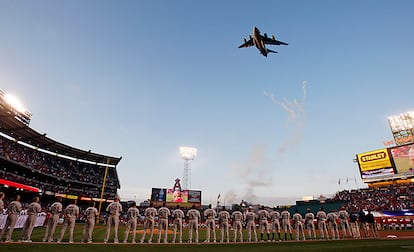Major League Baseball is quite serious about fighting climate change
MLB is finalizing a plan to reduce the environmental impact of the competition. Fewer (and closer) matches are planned. Will other sports follow suit?

Movies have taken it to every corner of the world. Philip Roth, Don DeLillo and Bernard Malamud devoted splendid novels to it. And still, baseball remains the least exportable of American sports. Its rules are complex; its rhythm, syncopated. Its mystique, its centuries-old traditions and its aura of an everyday epic barely make it through the borders. The last time the Baseball World Cup was held it was 2011, and it was before meager audiences. But despite it all, there is something that the rest can learn from Major League Baseball: how serious they are starting to take the fight against climate change.
These days, MLB is preparing a contingency plan whose main goal is to reduce the environmental impact of the competition. It revolves around shorter regular seasons, having fewer matches between teams from very distant areas and prioritizing land trips or regular flights. Last November, Seth Wynes, a researcher at Concordia University in Montreal, published a study showing that the carbon footprint of the four major professional leagues in the United States had decreased by 26% in the last two seasons due to the pandemic. The drop reached a very significant 50% in the case of the NHL – the ice hockey league – thanks to a very strict protocol that led to the cancellation of a high number of games.
Despite having a very active competition calendar, MLB had registered a drop in emissions of around 22%, in contrast to the 15% of the NBA or the meager 6% of the NFL. In light of these data, Sammy Roth, an expert on energy and the environment at the Los Angeles Times, commented in an article that consolidating the positive change that occurred as a result of exceptional circumstances would be very desirable. Roth found it disheartening to witness a final stretch of the 2019-2020 season with empty stadiums and a predominance of home games; however, in his opinion, a balanced middle ground, with around 10 less days in the regular season and a certain moderation of the trips, would reduce emissions by a very significant 11%.
For Milwaukee Brewers pitcher Brent Suter, one of the most committed baseball players in the fight against global warming, it would be a step in the right direction, if perhaps not enough. In an interview with Yahoo Sports writer Hannah Keyser, Suter pointed out that MLB regular seasons are lengthy affairs in which each of the 30 teams plays a total of 162 games, 81 of them as visitors, that involve many long flights.
The United States has become used to the “toxic” routine of baseball players competing every other day in games that, albeit lucrative, are often of very dubious sporting significance. For Suter, the professional players are already among those who are more interested in a substantial moderation of the competition calendar, in order to make it sensible and sustainable. Today – he says – the vast majority of players have surrendered to the evidence; they are fed up with playing July games at 95 degrees Fahrenheit in places that not long ago used to enjoy mild summers, like Milwaukee.
A study published by Climate Central mentioned that the average temperature at which MLB games are played has increased by an average of 2.1 degrees Fahrenheit since 1970. For Suter, we are not only destroying the planet, but also a centuries-old game that was not created to be practiced under extreme conditions. Against these threats, he says, individual commitment is not enough; it is essential to adopt ambitious collective measures, starting with a professional sport that acknowledges the need to play fewer games, travel by train whenever possible and, above all, forgo those coast-to-coast private flights that have become the most aggressive symbol of the opulence of the great American leagues.
Tu suscripción se está usando en otro dispositivo
¿Quieres añadir otro usuario a tu suscripción?
Si continúas leyendo en este dispositivo, no se podrá leer en el otro.
FlechaTu suscripción se está usando en otro dispositivo y solo puedes acceder a EL PAÍS desde un dispositivo a la vez.
Si quieres compartir tu cuenta, cambia tu suscripción a la modalidad Premium, así podrás añadir otro usuario. Cada uno accederá con su propia cuenta de email, lo que os permitirá personalizar vuestra experiencia en EL PAÍS.
¿Tienes una suscripción de empresa? Accede aquí para contratar más cuentas.
En el caso de no saber quién está usando tu cuenta, te recomendamos cambiar tu contraseña aquí.
Si decides continuar compartiendo tu cuenta, este mensaje se mostrará en tu dispositivo y en el de la otra persona que está usando tu cuenta de forma indefinida, afectando a tu experiencia de lectura. Puedes consultar aquí los términos y condiciones de la suscripción digital.









































